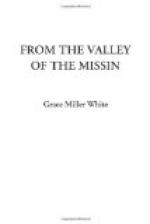“More than satisfied,” he said; “but somehow I feel—no I won’t say it, Ann. It would seem caddish to you.”
“Nothing you could say to me would seem that,” she answered.
Everett rose and walked up and down the room. “Well, it seems to me that, although the blood of the Brimbecomb’s is blue, mine is bluer still; that, while they have many famous ancestors, I have still more illustrious ones. I feel sometimes a longing to run wild and do unheard-of things, and to make men know my strength, to—well, to virtually turn the world upside down.”
A frightened look leaped into the girl’s eyes. He was so vehement, so passionate, so powerful, that at times she felt how inferior in temperment she was to him. Her heart swelled with gratitude when she realized that he belonged to her and to her alone. How good God had been! And every day in the solitude of her chamber she had thanked the Giver of every gift for this perfect man—since he was perfect to her. In a few moments she rose and walked beside him, longing to enter into the hidden ambitions of his heart, to read his innermost thoughts. Everett appreciated her feeling. Again he passed his arm around her, and for a time they paced to and fro, each thankful for the love that had become the chief thing in life.
“I have an idea, Ann,” began Everett presently, “that my mother will know me by the scar on me here.” He raised his fingers to his shoulder and drew them slowly downward as he continued. “And I know that she is some wild, beautiful thing different from any other woman living. And I’ve pictured my father in my mind’s eyes a million times, since I have found out I am not really Everett Brimbecomb.”
“But Mr. and Mrs. Brimbecomb have done everything for you—”
“So they have,” broke in Everett; “but a chap wants to know his own flesh and blood, and, since Mother told me that I was not her own son, I’ve looked into the face of every woman I’ve seen and wondered if my own mother was like her. I don’t want to seem ungrateful; but if they would only tell me more I could rest easier.” A painful pucker settled between his brows.
“Sit down here, Everett,” Ann urged, “and tell me if you have ever tried to find them.”
“I asked my fath—Mr. Brimbecomb today.” His faltering words and the change of appellation shocked Ann; but she did not chide him, for he was speaking again. “I told him that, now I was through college and had been admitted to the bar, I insisted upon knowing who my own people were. But he said that I must ask his wife; that she knew, and would tell me, if she desired me to know. I promised him long ago that I would register in his law office at the same time that Horace went to Vandecar’s. Confound it, Ann!—I beg your pardon, but I feel as if I had been created for something more than to drone over petty cases in a law office.”
“But, Everett, it has been understood ever since you went to Cornell that you should enter Mr. Brimbecomb’s office. You would not fail him now that he is so dependent upon you?”




